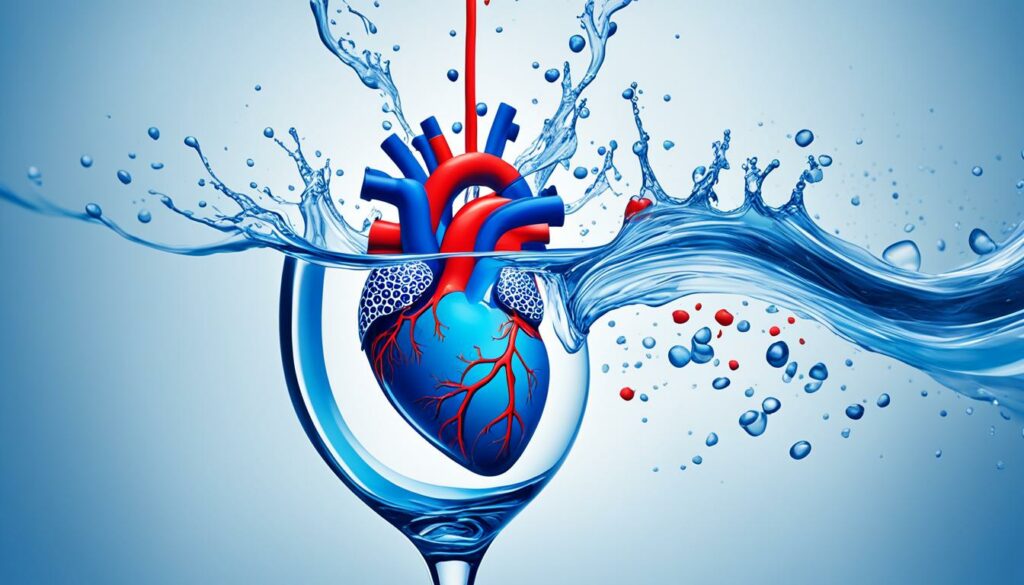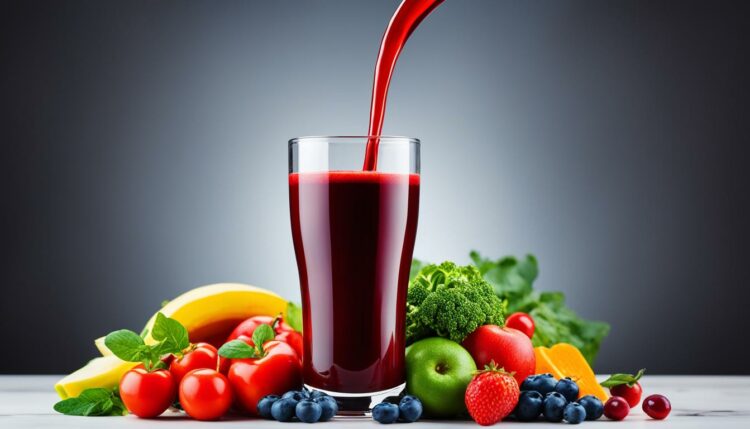To improve blood circulation and promote arterial dilation, there are several drinks that can be beneficial. Incorporating these beverages into your daily routine can support healthy arteries and enhance overall well-being.
One of the artery-opening beverages is pomegranate juice. Rich in polyphenol antioxidants and vitamin C, pomegranate juice has been shown to improve blood flow and strengthen blood vessels. It contains compounds that can promote arterial health and support optimal blood circulation.
Tea, particularly green and black tea, is another healthy beverage for arterial dilation. Tea is known for its antioxidants that protect against free radicals and have heart-healthy benefits. It can contribute to improved blood circulation and arterial health.
Beetroot juice is also beneficial for arterial health and blood pressure regulation. With its natural nitrates, beetroot juice can dilate blood vessels and increase blood flow throughout the body. Regular consumption of beetroot juice can help maintain healthy arteries and support optimal blood flow.
Lastly, staying hydrated with water, especially warm water, is essential for healthy arteries. Hydration ensures adequate blood volume for proper circulation. Drinking enough water is crucial for supporting arterial health and promoting optimal blood flow.
Key Takeaways:
- Pomegranate juice, tea, beetroot juice, and water are beverages that can promote arterial health and improve blood flow.
- Pomegranate juice is rich in polyphenol antioxidants and vitamin C, which strengthen blood vessels and support arterial health.
- Tea, particularly green and black tea, contains antioxidants that protect against free radicals and improve blood circulation.
- Beetroot juice is a nitrate-rich beverage that can dilate blood vessels and lower blood pressure, supporting optimal arterial function.
- Staying hydrated with water, especially warm water, is important for maintaining healthy arteries and promoting optimal blood flow.
The Benefits of Pomegranate Juice for Arterial Health
Pomegranate juice is a powerful beverage that offers numerous benefits for arterial health. Its rich composition of polyphenol antioxidants and vitamin C make it a valuable addition to a heart-healthy diet. These antioxidants improve blood circulation and strengthen blood vessels, promoting overall arterial health.
One of the key components of pomegranate juice is its nitrate content. Nitrates are natural compounds that have been shown to widen blood vessels, allowing for improved blood flow. This arterial dilation can have a positive impact on cardiovascular health, reducing the risk of heart disease and related conditions.
Furthermore, pomegranate juice possesses anti-inflammatory properties that can help reduce inflammation in the arteries. Chronic inflammation is a contributing factor to the development of arterial disease.
By consuming pomegranate juice regularly, individuals can support the reduction of inflammation, maintaining healthy and flexible arteries.

“Pomegranate juice is a delicious and nutritious beverage that can have a positive impact on arterial health. Its rich antioxidant content, along with its ability to widen blood vessels and reduce inflammation, makes it an excellent choice for improving blood flow and supporting overall cardiovascular well-being.”
Incorporating pomegranate juice into your daily routine can be as simple as enjoying a glass with your breakfast or as part of a refreshing afternoon snack. This flavorful juice provides a convenient and delicious way to enhance arterial health and promote optimal blood flow.
The Role of Tea in Arterial Dilation
Tea, especially green and black tea, offers numerous health benefits, making it a popular choice for those looking to improve blood circulation and promote arterial dilation. One significant advantage of tea is its rich antioxidant content, which helps protect the body from harmful free radicals that can contribute to heart disease.
Antioxidants, such as catechins and flavonoids, found in tea have been shown to support heart health and improve blood flow. These compounds help reduce inflammation and oxidative stress, which can lead to the narrowing of blood vessels and impair blood circulation.
In particular, ginger tea has been noted for its natural vasodilator properties. Vasodilation is the process of widening blood vessels, allowing for increased blood flow. By incorporating ginger tea into your daily routine, you can enhance arterial dilation and consequently improve blood flow throughout your body.
Incorporating tea into your daily routine can be a simple and effective way to support arterial health and improve blood flow.
Whether you prefer a refreshing cup of green tea or a bold black tea, both varieties offer heart-healthy benefits. Green tea, in particular, is known for its high concentration of catechins, while black tea contains theaflavins and thearubigins, both powerful antioxidants.
These compounds help reduce the risk of cardiovascular diseases, including high blood pressure and atherosclerosis.
Additionally, tea contains natural compounds called polyphenols that have anti-inflammatory properties, further promoting arterial health. By reducing inflammation in the arteries, tea helps maintain their flexibility and prevents the buildup of plaque, enhancing blood flow.
Overall, incorporating tea into your daily routine is a simple and enjoyable way to support arterial health and improve blood circulation. Whether hot or iced, tea offers a refreshing alternative to sugary and less heart-healthy beverages.
Beetroot Juice for Arterial Health and Blood Pressure Regulation
Beetroot juice is a powerful beverage that offers numerous benefits for arterial health and blood pressure regulation. Rich in natural nitrates, beetroot juice has the ability to dilate blood vessels, leading to improved blood flow throughout the body.
This is particularly advantageous for individuals with partly blocked arteries, as it helps to increase the delivery of oxygen and nutrients to various organs and tissues.
In addition to enhancing blood flow, beetroot juice has been found to have a positive impact on blood pressure levels.
Studies have shown that regular consumption of beetroot juice can lead to a significant reduction in systolic and diastolic blood pressure, thus promoting a healthier cardiovascular system. Lowering blood pressure is crucial for maintaining optimal arterial function and reducing the risk of heart disease.
Furthermore, beetroot juice is known for its high nitrate content, making it one of the nitrate-rich beverages that can benefit arterial health. Nitrates are converted into nitric oxide in the body, which helps to relax and widen blood vessels, ultimately improving blood flow and reducing the strain on the arteries.
| Benefits of Beetroot Juice | Lower Blood Pressure | Improve Blood Flow | Nitrate-Rich Beverages |
|---|---|---|---|
| ✓ Dilates blood vessels | ✓ Reduces systolic and diastolic blood pressure | ✓ Enhances blood flow throughout the body | ✓ High in natural nitrates that promote arterial health |
| ✓ Increases oxygen and nutrient delivery | ✓ Supports a healthier cardiovascular system | ✓ Reduces the strain on the arteries | ✓ Widens blood vessels for improved blood flow |
To incorporate beetroot juice into your diet, it is recommended to consume it in its natural form or as a part of fresh vegetable juices. However, it’s important to note that beetroot juice may have a noticeable impact on urine and stool color, turning them reddish or pinkish.
This is a harmless side effect but can cause concern for some individuals.
Overall, beetroot juice is a delicious and nutritious choice for individuals looking to improve arterial health and regulate blood pressure. Its nitrate-rich properties, combined with the ability to enhance blood flow and lower blood pressure, make it a valuable addition to a heart-healthy lifestyle.
The Importance of Water for Healthy Arteries
Water is essential for maintaining healthy blood flow and supporting arterial health. Proper hydration ensures that your blood volume remains adequate, allowing for optimal circulation throughout your body. In addition to its hydrating benefits, water offers numerous advantages for your cardiovascular system.
Drinking an adequate amount of water each day is crucial for promoting optimal blood flow. The recommended daily intake of water is up to two liters, which is approximately 67 ounces or a little over four 16 oz. bottles per day.
By consuming enough water, you can help prevent dehydration and maintain the necessary fluid levels in your blood.
One of the benefits of drinking warm water is its positive impact on arterial health. Cold water consumption can cause temporary constriction of veins, while warm water helps relax and widen your arteries, allowing for smoother blood flow. This arterial dilation can improve circulation and reduce the strain on your heart.
To ensure you are consuming water in the most optimal way, here are some tips:
- Drink water throughout the day, rather than consuming it all at once.
- Carry a water bottle with you to stay hydrated on the go.
- Set reminders or use apps to track your water intake.
- Opt for warm or room temperature water instead of cold water.
“Proper hydration is key to supporting healthy blood flow and maintaining arterial health.”
By prioritizing proper hydration, you can support healthy blood flow, promote arterial health, and enhance overall well-being. Remember to consult with your healthcare professional for personalized recommendations regarding your water intake and overall health.

| Benefits of Water for Circulation | Effect on Arterial Health |
|---|---|
| Optimizes blood flow | Reduces strain on the heart |
| Promotes hydration | Supports arterial dilation |
| Prevents dehydration | Enhances overall cardiovascular health |
Other Lifestyle Factors for Arterial Health
When it comes to promoting arterial health, making lifestyle changes is key. While incorporating artery-opening beverages into your diet is beneficial, it’s important to take additional steps to support healthy arteries and improve blood flow. Here are some lifestyle factors that can make a significant impact:
Exercise and Blood Circulation
Regular physical activity is critical for stimulating blood flow and supporting arterial health. Engaging in exercises that get your heart pumping, such as brisk walking, jogging, cycling, or swimming, can improve the efficiency of your cardiovascular system.
Exercise helps strengthen your heart and blood vessels, reducing the risk of arterial diseases.
Addressing Underlying Conditions
It is vital to address any underlying health conditions that may be impacting your arterial health. Conditions such as high blood pressure, obesity, diabetes, and high cholesterol levels can contribute to arterial damage and hinder blood flow.
Consulting with your healthcare provider to manage these conditions through lifestyle changes, medication, or other appropriate treatments is crucial.
Compression Socks for Circulation
Compression socks are a simple yet effective solution for individuals at risk of poor circulation. These specially designed socks provide gentle pressure on the legs and feet, promoting blood flow and reducing the risk of blood clots.
Compression socks are particularly beneficial for individuals who spend long hours sitting or standing, such as office workers, frequent travelers, or individuals with a sedentary lifestyle.
“Exercise is medicine for the body and blood flow. It keeps arteries flexible and helps prevent blockages. Make sure to incorporate physical activity into your daily routine for healthy arteries and overall well-being.” – Dr. Lisa Johnson, Cardiologist
By incorporating these lifestyle changes, you can take proactive steps to promote healthy arteries and improve blood flow. Lifestyle modifications, combined with artery-opening beverages, can have a synergistic effect on your cardiovascular health.
| Lifestyle Factors for Arterial Health | Benefits |
|---|---|
| Regular Exercise | Stimulates blood flow, strengthens the cardiovascular system |
| Addressing Underlying Conditions | Reduces arterial damage, improves overall health, minimizes risk factors |
| Compression Socks | Promote blood flow, reduce the risk of blood clots |
Remember, improving arterial health requires a holistic approach. By adopting these lifestyle changes, you can support healthy arteries, optimize blood flow, and safeguard your cardiovascular well-being.
Conclusion
In conclusion, incorporating specific beverages into your daily routine can play a significant role in promoting optimal blood flow and supporting arterial health. Pomegranate juice, tea, beetroot juice, and water are all natural remedies that have been shown to benefit arterial health.
Pomegranate juice is rich in polyphenol antioxidants and vitamin C, which can improve blood circulation and strengthen blood vessels. Tea, especially green and black tea, contains antioxidants that protect against free radicals and promote heart health.
Beetroot juice, on the other hand, has been found to dilate blood vessels and lower blood pressure, contributing to improved blood flow. Staying hydrated with water, particularly warm water, is also vital for maintaining healthy blood circulation.
When combined with other lifestyle factors such as regular exercise and addressing underlying conditions, these arterial health beverages can have a positive impact on cardiovascular health.
By incorporating these natural remedies into your daily routine, you can help maintain healthy arteries, optimize blood flow, and support overall well-being.
FAQ
What drink opens up arteries?
There are several beverages that can promote arterial health and improve blood flow. Pomegranate juice, tea, beetroot juice, and water all play a role in supporting healthy arteries and enhancing blood circulation.
What are the benefits of pomegranate juice for arterial health?
Pomegranate juice is rich in polyphenol antioxidants, which have been shown to improve blood circulation and strengthen blood vessels. Additionally, it contains vitamin C, which further supports arterial health. The nitrate content in pomegranate juice can widen blood vessels, facilitating better blood flow.
What is the role of tea in arterial dilation?
Tea, especially green and black tea, is known for its health benefits, including improving blood circulation and promoting arterial dilation. The antioxidants found in tea protect the body from free radicals, which can contribute to heart disease.
Ginger tea, in particular, acts as a natural vasodilator, widening blood vessels and enhancing blood flow.
How does beetroot juice benefit arterial health and blood pressure regulation?
Beetroot juice contains natural nitrates that can dilate blood vessels, increasing blood flow throughout the body. This can be especially beneficial for individuals with partly blocked arteries. Beetroot juice has also been found to lower blood pressure, which is essential for maintaining healthy arterial function.
Why is water important for healthy arteries?
Staying hydrated with water ensures that your blood volume remains adequate for proper circulation. It is recommended to drink up to two liters of water daily, which is approximately 67 ounces or a little over four 16 oz. bottles per day.
Warm water is particularly beneficial for arteries as cold water can cause temporary vein constriction.
What are other lifestyle factors for arterial health?
In addition to consuming artery-opening beverages, it is important to maintain an active lifestyle and exercise regularly, as physical activity stimulates blood flow and supports arterial health.
Avoiding prolonged periods of inactivity is also key. It is crucial to address any underlying conditions with your doctor, as these can impact arterial health. Wearing compression socks can be beneficial for individuals at risk of poor circulation, as they improve blood flow and reduce the risk of blood clots.
What is the conclusion regarding arterial health beverages?
By incorporating these natural remedies for artery health into your daily routine, such as pomegranate juice, tea, beetroot juice, and water, along with other lifestyle factors, you can promote healthy arteries and improve blood flow.




